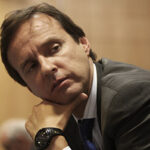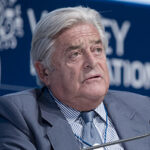Just after the announcement of the final reults that declared Michael Martelly as the elected Predident for Haiti, a delegation of the Club de Madrid travelled to the country to express the organisation’s support to the normal continuity of the democratic process. The delegation, leaded by Presidents Lacalle (Uruguay) and Quiroga (Bolivia), along Club de Madrid’s General Secretary Carlos Westendorp, discussed with the new leaders of the country and the highest authorities in duty the constitutional reform and the regulation of international aid as the most inmediate challenges that the new powers will have to face.
With the announcement of the definitive results of the second round of the parlamentarian and presidential elections, Haiti concluded a convulsed electoral process that has given power to a new president and a new parlament that will need to continue the process of physical and institutuional reconstruction of the country. Even though the emergency aid after the January 2010 earthquake allowed the inmediate support of the victims, the incipient process of reconstruction that followed was slowed down from the beginning of the electoral campaign in October 2010.
The investiture of the new President the forthcoming 14th May will mean the first pacific transmission of power between two elected presidents in the history of Haiti, a fact that the delegation celebrated with both the incoming and leaving presidents, Martelly and Préval, as a success in the decocratic pulse of the country.
The new parliament (which at the moment of writing this note is still pending of confirmation of 17 of its members) has a very narrow margin to approve the constitutional reform that would allow the reduction of the number of elections, the creation of a constitutional court and the double nationality, among other important reforms. The delegation defended, before the most important political groups, the limited but necessary approbation of the reform as a sample of democratic normalization and an advance towards the institutional consolidation of the country.
International help and its priorities and management where also one of the aims of this fourth mission of the project Global Leadership for Haiti Reconstruction, a Club de Madrid’s initiative with economic support of the European Union. Jorge Quiroga, former President of Bolivia, a country which during many years shared with Haiti the attention of the international aid and the lowest indexes of development, stressed the need of evolving from the implementation of projects by the international aid towards the starting up of true sectorial programs, defined and managed by the Haitian authorities with the support of the international community. From building schools towards a full educational program; from the delivery of healthcare towards a true politics of health, etc.
International aid to Haiti means 80% of its budget. The delegation insisted in the necessity of offering Haitian authorities, in cooperation with the International community, control over the use and management of the funds that will allow the effective administration of its resources for a good government of the country.
Club de Madrid’s delegation met with different international actors, both accredited ambassadors in Port Au Prince and representatives from MINUSTAH and the EU. There were also meetings with similar organisations to Club de Madrid which are active in Haiti, such as IDEA-International and Friedrich Ekbert Stiftung, with which posibble ways of joint cooperation where identified. Among both the Haitian actors and the international community, there is a close unanimity in the necessity of strenghtening the parlamentarian functioning and the political parties as the best way to support the institutional strenghtening of the country and the generation of goods and services that on a medium term answer the neccesities of the Haitians, free from exterior dependency.
Club de Madrid is committed to work for the future of Haiti, and to that end it makes its member’s political experience and leadership fully available to the new Haitian authorities.

